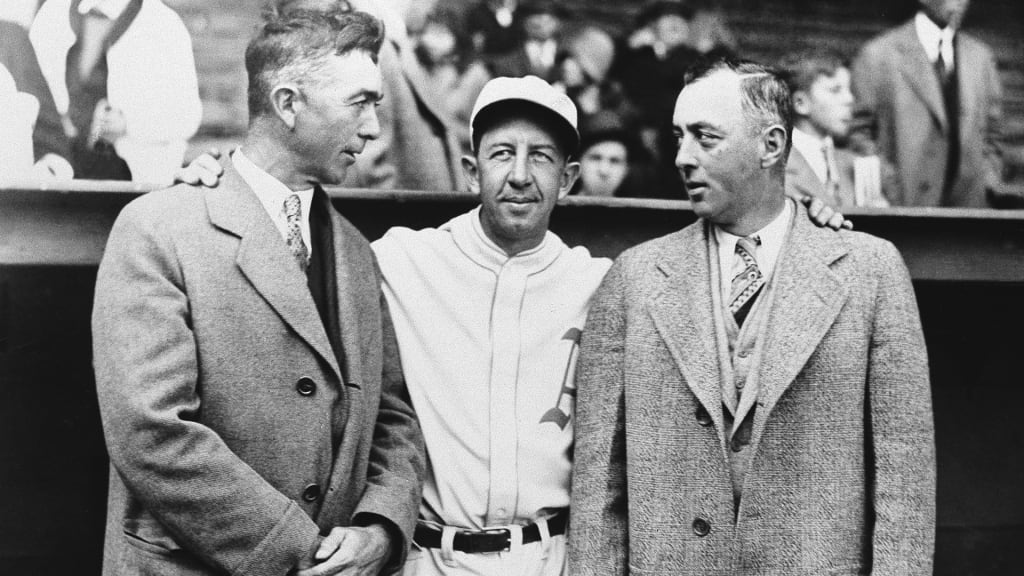Offense can be hard to come by in the postseason, but once in a while, the bats get hot and put a seriously crooked number on the scoreboard.
Just five times in postseason history, a team has scored at least 10 runs in a single inning. Two of those huge outbursts have come in the first inning -- both in the past two postseasons, against the same team.
Here is a look at the highest-scoring postseason innings in MLB history:
11 -- 2020 National League Championship Series Game 3, Dodgers vs. Braves (1st inning)
The Braves¡¯ pitching staff had put together a historic start to the 2020 postseason, allowing one or zero runs in five of six games before Game 2. But the Dodgers¡¯ bats got hot in the late innings of Game 2, and that carried over to Game 3 in a big way. Mookie Betts started the game off with an infield single, scored from first on Corey Seager¡¯s double, and they were off. Joc Pederson, Edwin R¨ªos and Max Muncy homered in the inning, with Muncy¡¯s grand slam capping off the 11 runs. They became the first team in postseason history with three home runs in the first inning and set a record for runs in any inning. On the other hand, the Braves are the only team to allow 10 or more runs in a postseason inning multiple times -- and both times were first innings.
10 -- 2019 NL Division Series Game 5, Cardinals vs. Braves (1st inning)
The Braves had a chance to clinch the NLDS in Game 4, but they lost in extras to the Cardinals. They entered the winner-take-all Game 5 with Mike Foltynewicz on the mound for his second start of the series, after he threw seven scoreless innings in Game 2. Game 5 did not go similarly -- Foltynewicz allowed seven runs in one-third inning and the Cardinals scored 10 total in the first off of him and Max Fried. St. Louis didn¡¯t hit a home run in the inning, scoring on a single, two bases-loaded walks, three doubles and a dropped third strike.
10 -- 2002 American League Championship Series Game 5, Angels vs. Twins (7th inning)
The Halos were trying to close out the best-of-seven series, but the Twins weren¡¯t making it easy. Minnesota scored three runs in the top of the seventh to take a 5-3 lead, threatening to take the teams back to the Metrodome for Game 6. Then, suddenly, it was all over. Adam Kennedy got things started with a three-run shot -- his third homer of the game -- off Johan Santana. The Twins proceeded to bring in a parade of three relievers, but by the time they stopped the bleeding, it was a 13-5 blowout. Kennedy, Scott Spezio and David Eckstein reached base multiple times in the frame for the Angels, who went on to win the World Series.
10 -- 1968 World Series Game 6, Tigers vs. Cardinals (3rd inning)
This is not a series in which one would expect to find a big inning, given that it¡¯s known for pitching. Detroit won a seven-game Fall Classic behind the work of MVP Award winner Mickey Lolich (three complete-game victories) and St. Louis fell short despite an historic performance from Hall of Famer Bob Gibson (three complete games, 35 strikeouts). But Gibson wasn¡¯t pitching in Game 6. Instead, it was Ray Washburn who fell behind, 2-0, in the second inning and exited after allowing the first three batters to reach in the third. Three relievers followed but couldn¡¯t restore order. Jim Northrup had the big blow, a grand slam, to make it 8-0. It was 12-0 by the end of the inning, and the Tigers won, 13-1, as they rallied from a 3-1 series deficit to win.
10 -- 1929 World Series Game 4, A¡¯s vs. Cubs (7th inning)
The A¡¯s entered the bottom of the seventh trailing, 8-0, against the Cubs. Chicago was six outs away from a win to even the series at two games apiece. And then the seventh happened. Philadelphia scored 10 runs in the inning to take a 10-8 lead it would not relinquish, then won the series two days later in Game 5. Al Simmons started the inning off with a solo homer. From there, the A¡¯s had four RBI singles, an RBI double and an inside-the-park home run from Mule Haas. Jimmy Dykes had two of those run-scoring hits -- a single and a double.


